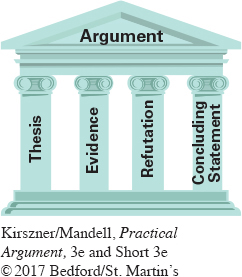Saletan, Please Do Not Feed the Humans
EXERCISE 5.9
The following essay includes all the elements of an inductive argument. After you read the essay, answer the questions that follow, consulting the outline on the previous page if necessary.
This essay appeared in Slate on September 2, 2006.
PLEASE DO NOT FEED THE HUMANS
WILLIAM SALETAN
1
Dug
In 1894, Congress established Labor Day to honor those who “from rude nature have delved° and carved all the grandeur we behold.” In the century since, the grandeur of human achievement has multiplied. Over the past four decades, global population has doubled, but food output, driven by increases in productivity, has outpaced it. Poverty, infant mortality, and hunger are receding. For the first time in our planet’s history, a species no longer lives at the mercy of scarcity. We have learned to feed ourselves.
2
We’ve learned so well, in fact, that we’re getting fat. Not just the United States or Europe, but the whole world. Egyptian, Mexican, and South African women are now as fat as Americans. Far more Filipino adults are now overweight than underweight. In China, one in five adults is too heavy, and the rate of overweight children is 28 times higher than it was two decades ago. In Thailand, Kuwait, and Tunisia, obesity, diabetes, and heart disease are soaring.
Page 145
3
Hunger is far from conquered. But since 1990, the global rate of malnutrition has declined an average of 1.7 percent a year. Based on data from the World Health Organization and the U.N. Food and Agriculture Organization, for every two people who are malnourished, three are now overweight or obese. Among women, even in most African countries, overweight has surpassed underweight. The balance of peril is shifting.
4
Fat is no longer a rich man’s disease. For middle-
5
Technologically, this is a triumph. In the early days of our species, even the rich starved. Barry Popkin, a nutritional epidemiologist at the University of North Carolina, divides history into several epochs. In the hunter-
6
You don’t have to go hungry anymore; we can fill you with fats and carbs more cheaply than ever. You don’t have to chase your food; we can bring it to you. You don’t have to cook it; we can deliver it ready-
7
What happened in America is happening everywhere, only faster. Fewer farmers’ markets, more processed food. Fewer whole grains, more refined ones. More sweeteners, salt, and trans fats. Cheaper meat, more animal fat. Less cooking, more eating out. Bigger portions, more snacks.
8
Kentucky Fried Chicken and Pizza Hut are spreading across the planet. Coca-
9
Soon, it’ll be a poor man’s death. The rich have Whole Foods, gyms, and personal trainers. The poor have 7-
10
“We evolved to survive scarcity.”
That’s the punch line: Technology has changed everything but us. We evolved to survive scarcity. We crave fat. We’re quick to gain weight and slow to lose it. Double what you serve us, and we’ll double what we eat. Thanks to technology, the deprivation that made these traits useful is gone. So is the link between flavors and nutrients. The modern food industry can sell you sweetness without fruit, salt without protein, creaminess without milk. We can fatten you and starve you at the same time.
Page 146
11
And that’s just the diet side of the equation. Before technology, adult men had to expend about 3,000 calories a day. Now they expend about 2,000. Look at the new Segway scooter. The original model relieved you of the need to walk, pedal, or balance. With the new one, you don’t even have to turn the handlebars or start it manually. In theory, Segway is replacing the car. In practice, it’s replacing the body.
12
In country after country, service jobs are replacing hard labor. The folks who field your customer service calls in Bangalore are sitting at desks. Nearly everyone in China has a television set. Remember when Chinese rode bikes? In the past six years, the number of cars there has grown from six million to 20 million. More than one in seven Chinese has a motorized vehicle, and households with such vehicles have an obesity rate 80 percent higher than their peers.
13
The answer to these trends is simple. We have to exercise more and change the food we eat, donate, and subsidize. Next year, for example, the U.S. Women, Infants, and Children program, which subsidizes groceries for impoverished youngsters, will begin to pay for fruits and vegetables. For 32 years, the program has fed toddlers eggs and cheese but not one vegetable. And we wonder why poor kids are fat.
14
The hard part is changing our mentality. We have a distorted body image. We’re so used to not having enough, as a species, that we can’t believe the problem is too much. From China to Africa to Latin America, people are trying to fatten their kids. I just got back from a vacation with my Jewish mother and Jewish mother-
15
The other thing blinding us is liberal guilt. We’re so caught up in the idea of giving that we can’t see the importance of changing behavior rather than filling bellies. We know better than to feed buttered popcorn to zoo animals, yet we send it to a food bank and call ourselves humanitarians. Maybe we should ask what our fellow humans actually need.

Identifying the Elements of an Inductive Argument
What is this essay’s thesis? Restate it in your own words.
Why do you think Saletan places the thesis where he does?
What evidence does Saletan use to support his conclusion?
What inductive leap does Saletan make to reach his conclusion? Do you think he should have included more evidence?
Overall, do you think Saletan’s inductive argument is relatively strong or weak? Explain.